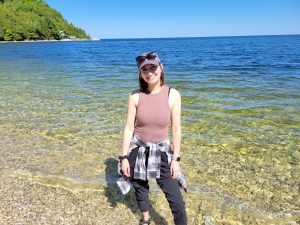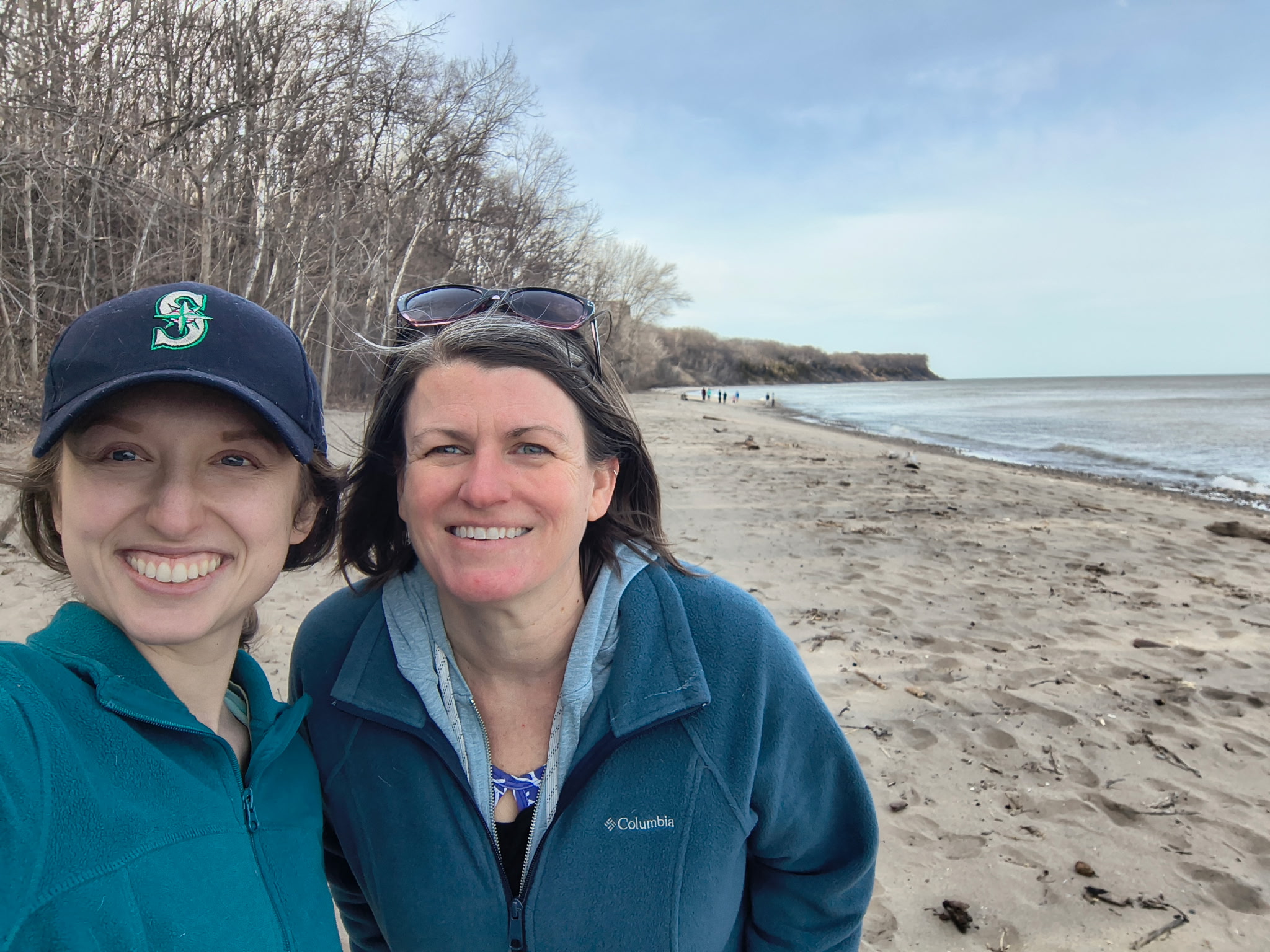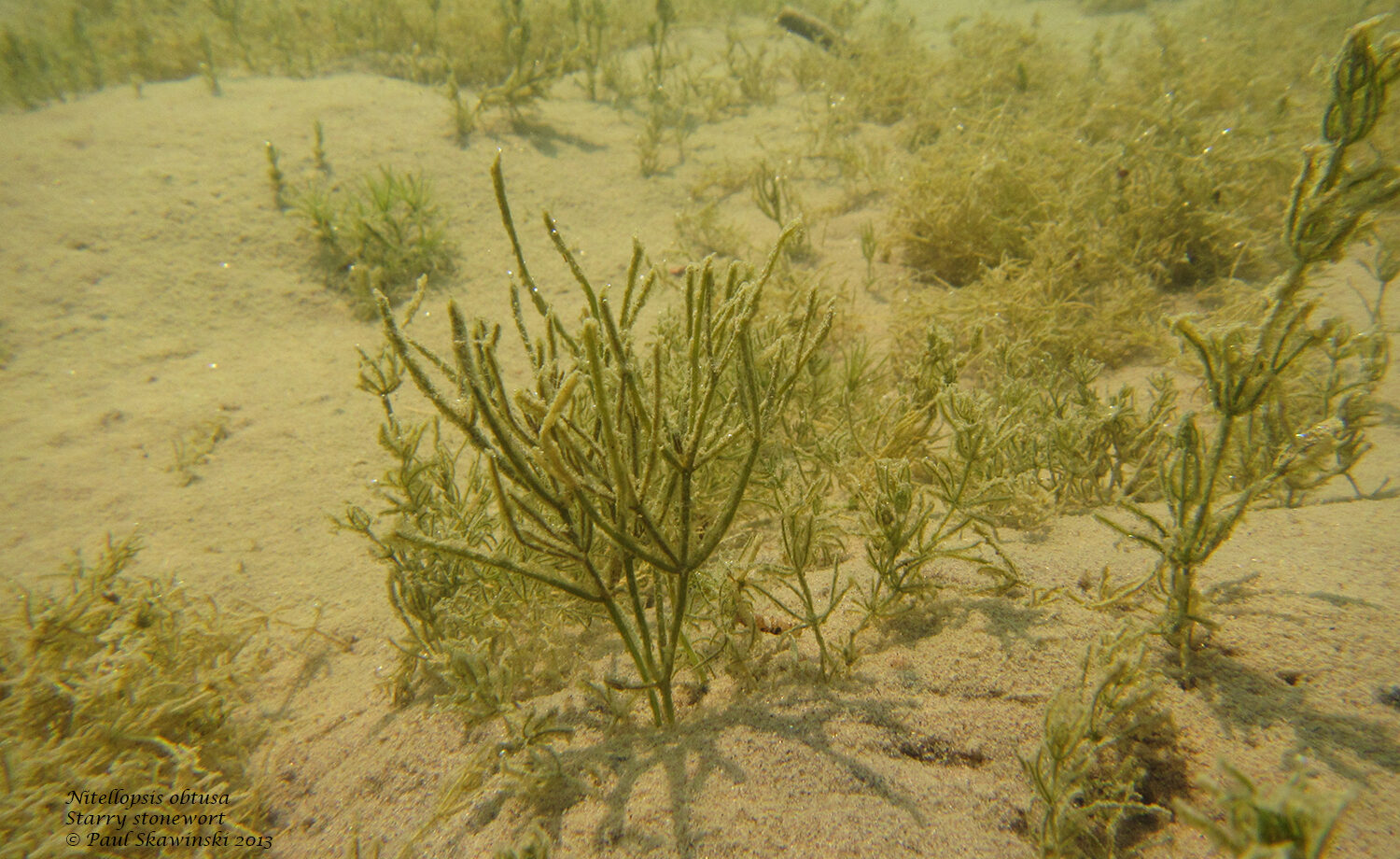For Emily Rau, whose term as the J. Philip Keillor Wisconsin Coastal Management-Sea Grant Fellow is coming to a close, the year-long position has been a homecoming in more ways than one. It brought her back to her home state of Wisconsin; to the city of her undergraduate alma mater, UW-Madison; and to a Sea Grant program.

Emily Rau, a 2021-22 Keillor Fellow, stands at Pebble Beach in Sister Bay, Wisconsin. For her fellowship, Rau has been stationed at the Wisconsin Coastal Management Program (WCMP). Some of the funding to help the Village of Sister Bay acquire this scenic shoreline came from the WCMP. (Submitted photo)
While in graduate school at the University of Michigan’s School for Environment and Sustainability, Rau spent two years as a research assistant at Michigan Sea Grant, where, among other projects, she was the lead author for a report about employment trends connected to the Great Lakes. At that neighboring Sea Grant program, she saw the organization’s value and that of the broader network of 34 university-based Sea Grant programs.
“Michigan Sea Grant helped me discover that I liked helping bridge the gap between science and decision making, especially when it comes to the Great Lakes,” said Rau. It also helped her locate her fellowship with Wisconsin Sea Grant—one that has felt tailor-made for her. Originally from Oak Creek, Wisconsin—a southern suburb of Milwaukee—Great Lakes coastal issues are close to her heart.
Said Rau, “This has been a perfect fellowship for me. I got to learn in depth about a specific subset of Great Lakes management and policy and how the Coastal Management Program works federally and on the state level. And I’m getting to broaden my network by interacting with experts and project partners who do coastal work.”
During her fellowship term from September 2021 to August 2022, Rau’s main task has been working on the third edition of the Wisconsin Coastal Processes Manual and shepherding it through the production process. That work has included writing and editing chapters, coordinating the review of chapters by Sea Grant Editor Elizabeth White, starting a reference system, cleaning up appendices, gathering images and more.
The manual has been a major undertaking that predecessors in her fellowship—including Sea Grant Coastal Engineer Dr. Adam Bechle, now one of Rau’s mentors—have also worked on. As Rau summarized, “The overall goal… is connecting the science of coastal processes with Wisconsin coastal communities along Lake Michigan and Lake Superior that can benefit from that information. It’s taking that science and bringing it to municipalities and local organizations in an easier-to-use format so they’re able to apply that work.”
When not occupied with the manual, Rau has tackled other projects, such as learning about the annual coastal grants cycle at the Wisconsin Department of Administration’s Coastal Management Program, where her office is stationed. Municipalities, local governments and university researchers can apply for funding from the program.
“That’s been eye-opening for me because I have never been a part of the grantmaking process before but wanted to experience it,” said Rau. Reviewing some of the submitted proposals and helping administer the grant program have broadened her professional skillset.
Rau also helped develop and facilitate a series of “research roundup” webinars with Carolyn Foley, Illinois-Indiana Sea Grant’s research coordinator, and Chiara Zuccharino-Crowe, Sea Grant liaison to NOAA (National Oceanic and Atmospheric Administration) for the Great Lakes region.
While her Keillor Fellowship is ending, Rau has her next step in her sights: contingent upon funding, she will continue working on coastal issues under another fellowship that will also be based at the Wisconsin Coastal Management Program. Through funds from the Bipartisan Infrastructure Law (Infrastructure Investment and Jobs Act) that NOAA’s Office for Coastal Management administers, she anticipates serving as the coastal infrastructure project coordinator, helping to plan, coordinate and develop habitat-focused infrastructure projects funded through that legislation.
As for the Keillor Fellowship focused on coastal hazards, that post will continue with a new fellow for the 2022-23 year, with Hannah Paulson picking up the reins. Stay tuned for more information about Paulson, who, like Rau, hails from a Wisconsin coastal community and holds degrees from both the University of Wisconsin and the University of Michigan.





